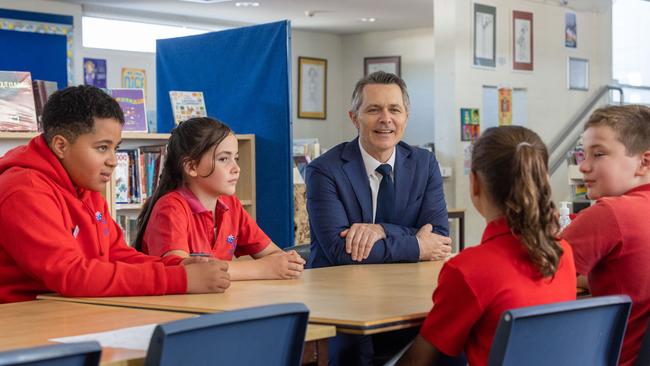Fuse uni degrees and TAFE together to pump up productivity, Business Council of Australia says
Employers would chip in for the cost of tertiary education in an ambitious fusion of university and TAFE qualifications devised by the Business Council of Australia.

Employers would chip in for the cost of tertiary education in an ambitious fusion of university and TAFE qualifications devised by the Business Council of Australia.
In a blueprint to bolster Australia’s disjointed and underperforming education system, the chief executives of the nation’s biggest corporations have called for a “reset’’ of every sector of education – from daycare through to degrees.
The BCA is highly critical of failures in the schooling system, and calls for a more “engaging curriculum’’, along with higher pay for the most talented teachers.
“Too many young Australians are leaving school without the basics and are ill-prepared for further study or work,’’ it states in its Seize the Moment report.
“Our tertiary education system is beset by a misaligned funding model, course designs that don’t meet the needs of employers and a structure that inhibits flexibility and collaboration.’’
The BCA states that “no amount of money” will fix the problems without reforms co-ordinated between governments, the education sector and industry.
“We’ve increased secondary education funding markedly in recent years, with little to show for it,’’ the report states.
“With two to three million Australian adults lacking some of the basic skills needed in life, such as reading writing, mathematics and digital literacy, it is clear more needs to be done.’’
The BCA calls for better teacher training – already being forced on universities by the nation’s training ministers – as well as higher academic standards and a more “engaging’’ curriculum.
“Our system is not geared to driving teachers towards excellence by rewarding and training them correctly,’’ its report states.
The BCA says the high drop-out rates from university degrees, as well as apprenticeships, show that school students are being given “poor careers advice or are incentivised into courses they’re not suited for’’.
It notes that one in every eight students who start a university degree will drop out within the first year, while 30 per cent of apprentices will quit during the first year of training.
“Failure rates of this level are a clear signal that something is not working,’’ it states.
“Either the student was not adequately prepared for the course or apprenticeship, or they chose the wrong path due to poor counselling.’’
The BCA also wants guaranteed and affordable access to kindergarten for all children from the age of three, warning that Australia’s fragmented and inconsistent system of early childhood education “leaves many children unprepared for school’’.

The BCA has thrown its weight behind a “tertiary guarantee’’ – a concept that federal Education Minister Jason Clare is considering as part of his Universities Accord overhaul of higher education.
The BCA says every Australian should be guaranteed a place in post-school education, paid for through a combination of taxpayer subsidies, loans, student fees and employer contributions.
Public subsidies would be highest for an initial foundation qualification, and for studies in fields of the greatest benefit to the public and industry.
The “tertiary guarantee” would give learners access to university, TAFE (Technical and Further Education), private training providers and work-based learning.
The BCA wants to break down the barriers between universities and vocational education and training (VET) providers, so that learners can combine parts of a degree with vocational training modules.

Workers’ on-the-job experience should also count towards a formal qualification, the BCA says.
Its report predicts that workers will need to learn one new task for very five they currently perform, and 90 per cent of new jobs will require further study beyond school.
The BCA backs the Universities Accord’s suggestion of a modern makeover of the traditional three-year bachelor’s degree, so students can gain formal qualifications by “stacking’’ shorter courses, known as micro-credentials, from universities, TAFE and private training colleges, or workplace courses.
To encourage collaboration between universities and TAFE, the BCA proposes that the federal government take over the state-based TAFE systems, and leave the states and territories to run schools.
The BCA wants governments to set up an official “digital portfolio’’ of education and skills, so employers can verify workers’ education, training, work and volunteering experience.
The online portfolio would also make it “easier for learners to change degrees or institutions while still receiving recognition for what they have done”, the report states.
“Such a system would need to recognise the skills and competencies developed not just through higher education and VET, but through work-based training.’’






To join the conversation, please log in. Don't have an account? Register
Join the conversation, you are commenting as Logout